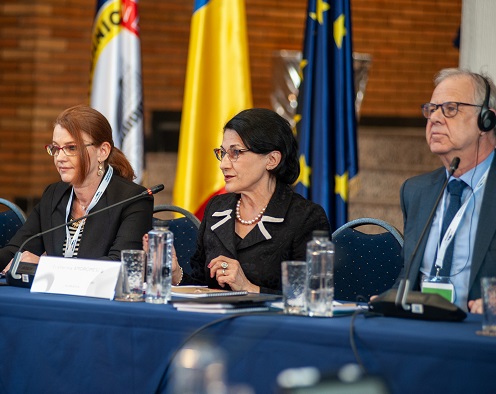Organisational Development
Membership
Slovakia joined EQAR as governmental member in spring. This brought the number of governmental members involved in the overall governance of EQAR to 41. All 48 signatory countries of the Bologna Process can become governmental member of EQAR.
Statutory bodies
At the General Assembly in Bucharest on 3 April 2019, held in the Rectorate of Polytechnic University of Bucharest, hosted by the Romanian Ministry of National Education in the framework of the Romanian Presidency of the Council of the EU, several elections took place:
Register Committee
The General Assembly approved the nominations to the Register Committee for a two-year mandate, starting on 1 July 2019. Three new members were nominated (and all other Register Committee members were re-nominated):
- Eltjo Bazen (nominated by EURASHE )
- Patricia Georgieva (nominated by EURASHE )
- Jacques Lanares (nominated by EUA)
Appeals Committee
The General Assembly elected a new Chair and Deputy Chair. The remaining members and deputy-member of the Appeals Committee were re-elected.
- Paul Zoontjes (Chair)
- Jiri Nantl (Deputy Chair)
Executive Board
According to the agreed annual rotation, the Executive Board assumed the following functions as per 1 May 2019, with Karl Dittrich as President:
- Maria Kelo (ENQA) – Vice-President
- Gohar Hovhannisyan – (ESU) – Treasurer (by-elected as per 3 April 2019)
- Michal Karpisek (EURASHE) – Member
- Tia Loukkola (EUA) – Member
See under Annexes “EQAR data” the full composition of the various EQAR bodies in 2019.

Staff
EQAR had some staff changes in 2019, not only because of the DEQAR project, but also because of the increased workload with regard to the Register Committee. A new Policy and Project Officer was hired, Jelena Šantić Stefanoska, to support the general operation of the EQAR secretariat, the DEQAR project and the Register Committee by analysing applications and reports, as well as review and update information and guidance for applicant agencies.
The total Secretariat staff at the end of 2019 was 4,2 FTE.
Finances
The financial year 2019 resulted in a small deficit of EUR 2 087,38, recovered from accumulated surpluses.
EQAR relies on a diverse funding base including annual contributions from its members (governments and European stakeholder organisations), application and listing fees paid by quality assurance agencies and occasional project grants. In 2019, EQAR received a grant under the Erasmus+ programme as coordinator of the DEQAR (Database of External Quality Assurance Reports) project.
| Assets | Liabilities and Equity | ||
|---|---|---|---|
| Fixed assets | 5 093,93 | Own funds | 164 059,26 |
| Immaterial assets | 1 012,50 | Profit/loss previous years | 46 146,64 |
| Office equipment | 3 933,77 | Result per 31/12/2019 | -2 087,38 |
| Guarantees | 147,66 | Reserves | 120 000,00 |
| Liquid assets | 300 435,99 | Liabilities | 141 470,67 |
| Receivables up to 1 year | 110 736,37 | Payables up to 1 year | 128 198,67 |
| Cash and term accounts | 182 458,73 | thereof: pre-financing EU grants | 47 257,07 |
| Adjustment accounts | 7 240,89 | Adjustment accounts | 13 272,00 |
| Total | 305 529,92 | Total | 305 529,92 |
| Income | Expenditure | |||
|---|---|---|---|---|
| Operational income | 488 603,19 | Operational expenditure | 490 616,46 | |
| Membership fees | 344 356,00 | Meetings | 69 366,58 | |
| Agency fees | 64 242,00 | Project direct costs | 54 694,60 | |
| Project income | 74 613,68 | Office and administration | 58 225,76 | |
| Other income | 5 391,51 | Staff | 258 438,50 | |
| Other costs | 49 891,02 | |||
| Operational result | -2 013,27 | |||
| Financial income | 21,80 | Financial costs and taxes | 95,91 | |
| Total result | -2 087,38 | |||
| Withdrawal from reserves | 0,00 | Allocation to reserves | 0,00 | |
| Result to be reported | -2 087,38 | |||